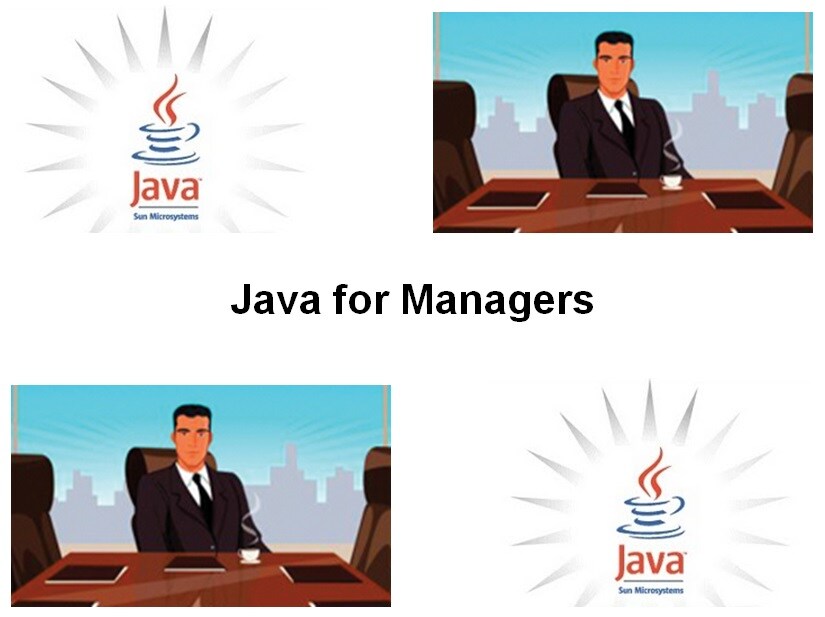-
Learning by doing
-
Trainers with practical experience
-
Classroom training
-
Detailed course material
-
Clear content description
-
Tailormade content possible
-
Training that proceeds
-
Small groups
In the course Java for Managers the basic principles of object oriented programming in the Java language and the operation and capabilities of Java technology are discussed. Attention is paid to both client and server technology.
The course is always aimed at making clear the principles without going into details. Both the syntax and control flow constructs of Java are discussed as well as object oriented things such as classes, inheritance, interfaces and exceptions. In this respect also UML as modeling language for software systems is on the course schedule.
Regarding client technology both Rich Client Applications with GUIs as well as applets and Java Web Start applications are discussed.
Regarding server technology the focus is on Java Enterprise applications running on application servers and Jakarta EE technologies like Servlets, JSPs and EJBs are addressed.
Furthermore, the different ways in which Java applications can store data is on the course schedule. Attention is paid to direct file I/O, serialization, JDBC, Hibernate and the Persistence API.
Finally, various Java integration technologies like RMI, JMS and Web Services are discussed. The course contents covers the requirements of the Java Associate exam 1Z0-850.
Managers of Java software teams, project leaders of Java software projects, junior Java Developers and other interested persons who want to gain insight in Java software.
General basic knowledge of computer systems and software development is required. Programming experience is an advantage in following this course.
The theory is treated by means of presentation slides and is interspersed with exercises. Demos are used to clarify the theory. The course has a hands-on nature. The course material is in English. The course times are from 9.30 up and to 16.30.
Participants receive an official certificate Java for Managers after successful completion of the course.

Module 1 : Java Platform |
Module 2 : Java Language |
Module 3 : Object Orientation and UML |
| History of Java Java Overview Java Editions Java Platform Java Community Process Java Libraries Java Language Compiling Java Programs Running Java Programs Compiler and Interpreter Application structure Garbage Collection Packages Import statement |
Variables Types of Variables Primitive Data Types Block Statements Operator Precedence if else Statements switch Statement for and while Loop do while Loop break and continue Arrays Enhanced For Loop Strings Formatted Output |
Programming Paradigms Procedural Programming Object Oriented Programming Classes and Objects Abstraction and Modularity Encapsulation and Data Hiding Inheritance and Polymorphism UML Diagrams Use Cases Sequence Diagrams Class Relationships Generalizations Associations and Aggregations Class Diagrams |
Module 4 : Classes and Interfaces |
Module 5 : Rich Clients |
Module 6 : Jakarta EE Applications |
| Java Class Definition Access Modifiers Constructors Creating Objects Fields and Methods Overloading and Overriding this keyword extends keyword Abstract Classes Interfaces Exceptions Packaging in JAR Threads Java Beans |
Java GUI's Abstract Window Toolkit GUI Design with AWT AWT Containers Window Containers AWT Controls Swing AWT versus Swing Swing Component Hierarchy Layout Managers Event Delegation Model Java Applets Java Plug-In Java Web Start |
Jakarta EE Enterprise Challenges Jakarta EE Standard Jakarta EE Servers Web Components EJB Components Persistent Entities Jakarta EE and Web Services Container Services Jakarta EE Deployment Annotations Packaging in EAR Files Development Roles Jakarta EE API's |
Module 7 : Servlets and JSP’s |
Module 8 : Java Persistence |
Module 9 : Integration Technologies |
| What is a Servlet? Possible Servlet Tasks HTTP Protocol Form Submissions Concurrent Access What is a JSP? JSP Translation Time JSP Request Time Scopes in Web Applications ServletContext Scope Session Scope Classic MVC Pattern Model 2 Architecture Web Application Structure |
Java Persistence Traditional Persistence Transparent Persistence Direct File I/O Serialization Java Database Connectivity JDBC Architecture Problems with JDBC Hibernate Persistent Classes Mapping Files Persistence API Entities Entity Lifecycle |
Remote Method Invocation RMI Architecture Remote Interface and Object Stubs and Skeletons Remote Object Use Java Message Service Messaging Models Point to Point Publish and Subscribe JMS Programming Model Web Services SOAP and WSDL WSDL and Code Generation JAX-WS and SAAJ |
